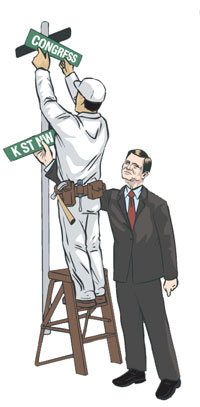
The 'K Street' Effect Hits Texas
I. Introduction
Indicted Congressman Tom DeLay owes his extraordinary rise and fall as House Majority Leader to his relentless pursuit of special-interest money. Long before DeLay, beltway lobbyists relied on campaign contributions to ease their access to money-hungry politicians. But DeLay and conservative activist Grover Norquist rewrote the ground rules of Washington’s influence game when they created their aggressive “K Street Project” in the late 1990s. DeLay’s K Street Project ran Washington as a pay-to-play town. If top lobbyists wanted access to the Republican majority, DeLay expected them and their clients to dig deep for Republican causes, particularly one that became known as DeLay, Inc. The K Street project also threatened reprisals against lobby shops and trade associations that failed to replace the Democrats in their top ranks with leaders sporting GOP credentials.1
Once established as a ruthlessly effective way for incumbents to raise money, the K Street Project model was ready for export to statehouses nationwide. Several factors made Texas especially ripe for the K Street pay-to-play model. Austin is home to the nation’s largest lobby that works unencumbered by campaign contribution limits.2 California, which limits individual contributions to candidates for state office, prohibits registered lobbyists from contributing to candidates for an office that that lobbyist seeks to influence.3 In contrast, Texas imposes no limit on what lobbyists or other individuals can give to non-judicial candidates. In the 2004 election cycle alone, for example, the No. 1 lobbyist in Texas contributed more than $400,000 of his own money to influence Texas’ state elections.
The 2000 presidential election of Texas Governor George W. Bush also primed the pump for an Austin K Street Project. Many Austin lobbyists served as elite “Pioneer” fundraisers for Bush’s first presidential campaign, with some Texas lobbyists and political consultants following Bush to Washington to become federal lobbyists. Bush’s election literally put Austin lobbyists to work on K Street, where they became intimately familiar with the eponymous Republican fundraising scheme.
Finally, K Street Project architect Tom DeLay personally introduced his fundraising scheme to Texas in 2001 when he created Texans for a Republican Majority PAC (TRMPAC). DeLay created TRMPAC to help Republicans take control of the Texas House in 2002, a feat that allowed him to redraw Texas’ congressional districts in 2003. TRMPAC hired DeLay fundraiser Warren RoBold to raise money for this state PAC from Washington’s corporate lobby. RoBold raised more than $600,000, raking in most of it from lobby-rich Washington fundraisers featuring special guest Tom DeLay.
RoBold’s TRMPAC work—conducted out of the offices of DeLay’s federal Americans for a Republican Majority PAC—bore K Street Project hallmarks. There is some evidence, for example, that TRMPAC used lobbyists to help it raise corporate funds. An earlier Texans For Public Justice report identified 11 federal lobby firms that had multiple clients that contributed to TRMPAC.4 Clients of these firms supplied more than half of TRMPAC’s total corporate funding, strongly suggesting that some of these lobbyists were soliciting their clients to fund DeLay’s Texas PAC. These firms included Alexander Strategy Group, the Federalist Group and Preston Gates Ellis & Rouvellas, firms that boasted some of K Street’s closest ties to DeLay. Another TPJ report identified four elite Texas firms that represented multiple TRMPAC-donor clients in 2002.5 These firms—HillCo Partners, Locke Liddell & Sapp, Toomey & Associates and the Austin office of Akin Gump—had other intriguing TRMPAC ties. If TRMPAC had not used the K Street model to aggressively leverage corporate money it would have been a much smaller PAC—one that may have escaped criminal indictment.
If Austin did embrace the K Street Project model in the first years of this century, top lobbyists and lobby firms seeking access to Texas’ GOP leadership would have come under enormous pressure to dramatically increase their political contributions. Conversely, once the K Street model came to town, elite lobbyists who did not succumb to this pressure would have fallen out of the top tier of Texas’ lobby elite. Texas Ethics Commission data show that this is precisely what happened.
1. In a famous example, the House Ethics Committee admonished DeLay in 1998 for punishing the Electronic Industries Alliance for hiring a Democratic executive director by delaying a vote on an intellectual-property bill that this trade group wanted.
2. While different reporting requirements confound exact comparisons, California and Texas compete for the title of the state in which special interests spend the most money on lobbyists. See Austin’s Oldest Profession, 2004 edition, TPJ, August 4, 2004.
3. California Proposition 208 of 1996 prohibited registered lobbyists from contributing to any state candidate. California’s high court later narrowed this restriction to apply just to candidates for offices before which a given lobbyist practices.
4. See TPJ’s Lobby Watch, “‘K Street Project’ Delivered For DeLay’s Indicted PAC,” October 11, 2004.
5. See TPJ’s Lobby Watch, “17 Texans Lobbied in 2002 For Multiple TRMPAC Donors,” October 12, 2004.
©Copyright Texans for Public Justice, July 2006